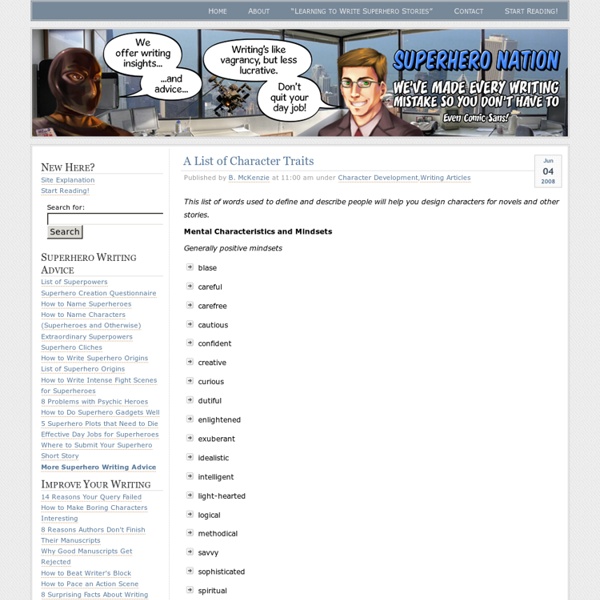Character Trait Cheat Sheet - Kris Noel
In order to create a relatable character, you must think about them as having several layers. Knowing and choosing character traits is important because you don’t want them to be one dimensional. It’s all not as simple as saying “this person is mean” or “this person is kind”. Think about the people you know in real life.
Character and Characterisation in the Novel
How to write convincing characters Characterisation - the task of building characters - isn't easy. But if you're struggling to build characters with real life and vigour, just follow these rules. If you do follow them correctly, we can pretty much guarantee that your characterisation will be just fine! Know what kind of character you are writing
Character Flaw Index
To make characters realistic and relatable they are given flaws, because if there is anything a writer can be sure of it is that no one in their audience will be perfect. Flaws are character traits that have a negative impact in the narrative, unless they are simply informed. They can also be exploited.
Sleep learning is possible: Associations formed when asleep remained intact when awake
Is sleep learning possible? A new Weizmann Institute study appearing August 26 in Nature Neuroscience has found that if certain odors are presented after tones during sleep, people will start sniffing when they hear the tones alone -- even when no odor is present -- both during sleep and, later, when awake. In other words, people can learn new information while they sleep, and this can unconsciously modify their waking behavior. Sleep-learning experiments are notoriously difficult to conduct. For one thing, one must be sure that the subjects are actually asleep and stay that way during the "lessons."
Timeline Platform
Featured Customers MyHeritage.com is a world-leading family social nework. Its 50 million users create family trees, share family photos and organize their genealogical information online. MyHeritage.com has cooperated with AllofMe to leverage the AllofMe platform for helping users view and compare their family photos and events in a super-cool, fun-to-use, chronological timeline.
inklewriter - Education
Education inkle is looking to bring interactive stories to the classroom, and give teachers free and simple get-stuck-right-in software to use with their students. From within a web-browser, the inklewriter will let students make and play interactive stories with no programming required. Why make stories interactive anyway? The way our stories work is simple: the reader is given the text of a story in a small chunks, and after each, they get to make a decision about what happens next. That could be what a character says, or does - but it could also be a deeper choice, like why a character has done what they've done, or how they feel about something else in the story.
QR Code Generator: QR Stuff Free Online QR Code Creator And Encoder For T-Shirts, Business Cards & Stickers
PowToon
Only2Clicks - speed dial to favorite web site and make it your start page
Shelfari
Classroom 2.0
Where the Wonders of Learning Never Cease



